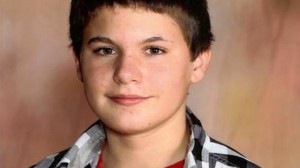
The “It Gets Better” campaign is in full swing, but some teens have yet to understand its message. Jamey Rodemeyer, 14, was another teen who fell victim to bullies after taking his own life on the eve of the National Bullying Summit. Rodemeyer gave ample warning signs that he was struggling with his sexuality through various social networking posts, eventually leaving his last video as an “online farewell,” ABC News reports.
The Buffalo, N.Y. teen had faced numerous accounts of bullying through his Formspring account. Disparaging comments like “JAMIE IS STUPID, GAY, FAT ANND [sic] UGLY. HE MUST DIE!” tormented the young teen, and things did not get better, even despite family counseling to address the issue.
Rodemeyer’s death “coincides with a national summit today sponsored by the U.S. Department of Education in Washington, D.C., an effort to stem the toll of bullying on school children,” ABC News reports, and his suicide also verges on a solemn cusp to LGBT History Month which is celebrated in October.
“Jamey’s suicide is a tragic reminder of the vulnerability of gay teens,” said Malcolm Lazin, founder and executive director of the Equality Forum. “They are bullied and marginalized,” he said. “While some may say that Jamey took his life, it is unrelenting homophobia that murdered him.”
While some school districts including the San Diego Unified School District and the Los Angeles Unified School District have implemented anti-bullying regulations, cyberbullying can often be difficult to enforce or reprimand.
“We have seen some positive signs in available resources and supportive educators and society is moving in a good direction,” GLSEN spokesman Daryl Presgraves said. “But it’s still very difficult to be an LGBT youth in school.”
Rodemeyer’s haunting last messages on Facebook are a solemn reminder to teacher, parents, and allies that a suicidal teen will speak out, even cryptically: “No one in my school cares about preventing suicide, while you’re the ones calling me [gay slur] and tearing me down,” he wrote.
To get help, go to the National Suicide Prevention Lifeline or call 800-273-TALK.
Also call the Trevor Project Lifeline at 866-488-7386.











